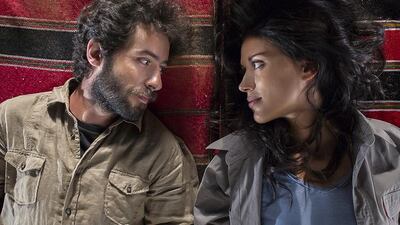The controversy over Steven Spielberg and JJ Abrams' decision to appoint Lena Dunham to adapt the novel A Hope More Powerful Than the Sea for the screen shows no sign of abating.
We reported on the announcement earlier in the week, and already many commentators online were uncomfortable with the decision. The novel tells the true story of a Syrian mother who survived two days at sea on an inflatable life ring with her two children while trying to flee the war zone, and many felt that Dunham's white, middle class background did not appropriately equip her for the role.
Now, a number of voices from within the Syrian, Middle Eastern and wider movie and literary community have joined the debate, and things don't seem to be getting much better for the beleaguered Dunham. Perhaps unfairly, most of the criticisms seem to be levelled at the actress, writer, and creator of Girls, rather than the two men who made the decision, which in itself perhaps says something about attitudes to women in Hollywood, although that's a separate story.
Syrian-American author Alia Malek, who wrote The Home That Was Our Country: A Memoir of Syria engaged in a lengthy Twitter thread in which she questions why Hollywood seems to have understood that black writers should be given the opportunity to tell their own stories, but is unable to translate this idea to Middle Easterners.
She also questioned the value of the original novel, pointing out that it is written not by an independent journalist, but by UNHCR worker Melissa Fleming. While Malek concedes that the book is full of “good intentions," she counters that the UNHCR relies on refugees for its very existence, giving a strange dynamic to the situation. In essence, it is in the UNHCR’s best interests for refugees to continue to exist.
Malek also took to the pages of the UK's Guardian to elaborate on her thoughts, where she noted that Hollywood writers do not have a great record when it comes to telling Middle Eastern stories: "Hollywood and media portrayals of the diverse peoples of the Middle East have dehumanised and reduced hundreds of millions to a monolith," she says. "As geopolitics evolved, the enemy Arab easily morphed into a more vague enemy: the Muslim (a much larger group). This, in turn, gives Americans cover to not question US policies in the Middle East, as if the entire region was congenitally doomed to chaos and misery."
Malek also noted that the reason for the success of Girls was that it derived directly from Dunham's own experience, and that's precisely why she should not be writing this film.
Malek even had a suggestion for who should write the film - recent Venice winner Soudade Kaadan.
Amreeka and May in the Summer director Cherien Dabas agreed.
Black Jewish film maker Rebecca Pierce, meanwhile, pointed out that there are plenty of people with direct experience of the situation in Syria who are capable of writing screenplays.
New York film critic Rebecca Theodore-Vachon, meanwhile, had a worrying reminder that Dunham does not have a great track record when it comes to casting non-white characters. When she cast Riz Ahmed, of South Asian origin, as the father of her child in Girls, she also cast a black-Latino child as their offspring.
Azita Ghanizada, meanwhile, who runs MENA Arts Advocacy Coalition and has tirelessly campaigned for greater recognition for Middle East actors in Hollywood, simply called it a "terrible terrible idea."
Thankfully, there was some humour to be found in the situation too. Lena Dunham Apologises is a Twitter page which satirises Dunham’s frequent public apologies, which are numerous. In the real world, she's apologised for expressing regret at never having had an abortion, defending an alleged rapist who was a writer on her show, and comparing Bill Cosby’s sexual offences to The Holocaust, to name but three.
In The Twitter page’s satirical world, they include such sins as convincing Mark Zuckerberg to turn Facebook into a site that installs fascist governments and designing Ben Affleck’s back tattoo.
In fictional Lena Dunham Facebook apology world, she had this to say on the film:
Dunham herself is yet to respond.

